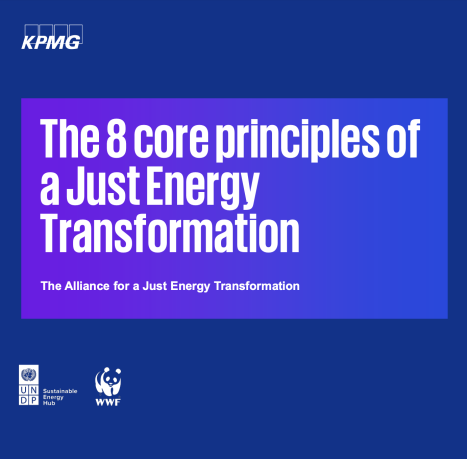What is a JUST energy transition
When the world is moving towards more sustainable and green energy solutions, the industries and societies change, which poses risks of e.g. jobs disappearing, new health issues arising, increased demand of critical minerals or biofuels and need of change in education. Additionally, as underlined in a recent policy paper giving governance guidance for a just energy transition by United Nations Development Programme (UNDP)
https://www.undp.org/publications/strengthening-energy-governance-systems-energy-governance-framework-just-energy-transition
Boaz Paldi, Chief Creative Officer of UNDP was invited to hold a virtual keynote address during the stakeholder workshops, on topic; “What is a Just Transition – and why is it important?”. He shared the aim of leaving no one behind, and referred to a document highlighted at the Sustainable Energy Hub of UNDP
The 8 core principles of a Just Energy Transformation
- Be guided by science and understand the urgency to reduce emissions in line with the goals set out by the Paris Agreement.
- Be fair and uphold the rights, needs and values of everyone. No single group should be privileged over others and the upfront costs must not fall on those with the least responsibility for climate change or ability to bear them.
- Be sustainable, ambitious and consistent with wider, holistic strategies that contribute to the energy transition needed to limit global temperature increase to 1.5°C, or well under 2°C.

(Source: UNDP website)
- Be comprehensive, transparent and inclusive which requires that just transition strategies developed at the national level to be co-designed and implemented at the local level.
- Ensure clearly-defined, robust and meaningful stakeholder engagement and social dialogue, including a specific focus on social protection and gender equality policies to promote equitable access to benefits.
- Be centered on climate justice so that the burdens of climate change, as well as the costs of avoiding it, are shared fairly; both internationally and inter-generationally. Implementation of the transition must support jobs, local communities and improve human wellbeing in the developing world.
- Recognize energy access as an essential contributor for social wellbeing, economic growth, enabler of sustainable development and improved livelihoods and transformation of energy systems must enable large scale access to clean, safe and reliable energy to meet developmental needs of all.
- Ensure access to justice, decision-making and information. A common approach to investment which upholds indigenous and local community rights. Recognition and implementation of the right to meaningful participation in energy transition decision-making processes for all stakeholders, acknowledging and compensating for differences in resources and capacity to engage.
The mineral need is a huge challenge and can lead to goal conflicts. Norway’s planned seabed mining, for instance.
Mikkel Vindegg, Senior Researcher
CICERO, Center for International Climate Research
CICERO, Center for International Climate Research